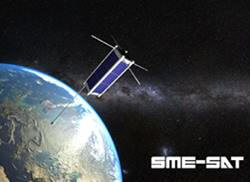
Small and Medium Enterprise Satellite
SME-SAT
From 2013-01-01 to 2015-12-31.
FP-7 Collaborative project No 312993- Small or medium-scale focused
research project.
Work programme topics addressed: SPA.2012.3.1-01 Bringing terrestrial
SME research into the space domain.
“SME-SAT” is the FP7
project involving LCISR collaborators.
Fueled by mass market demand, terrestrial consumer electronics continue
to drive technology advancement in the field of microelectronics
devices. Many of these technologies are spearheaded by the contributions
of Small and Medium Enterprise (SME). There is a clear opportunity to
revolutionize space technologies by leveraging advancement in the
commercial electronics market. However, despite the obvious benefits to
the space industry, it remains difficult for SMEs to get involved due to
the significant cost, effort, time, and paper work to qualify parts for
space applications. A trend toward smaller and cheaper satellites allows
for a novel approach to space qualification and testing. Nanosatellites
(between 1kg and 10kg) can be launched at a relatively low cost as piggy
back payloads for larger satellite missions. Since the cost of failure
is an order of magnitude lower than conventional satellites,
nanosatellites offer an ideal platform for high risk demonstration
missions.
The aim of this project is to flight qualify a wide range of SME
payloads in a 3U 3kg nanosatellite platform operating at a 700km orbit.
The primary purpose of this spacecraft is as a technology demonstrator.
Each SME in the consortium will be responsible for contributing a
particular spacecraft subsystem. The University of Surrey will integrate
these systems into the nanosatellite platform, and will also be
responsible for the ADCS and CMGs of the satellite. ISIS will oversee
the launch opportunity and deployment of the satellite. Astrium, as a
Large System Integrator (LSI), will help roadmap the technology
demonstrated in this mission to future applications within the European
space framework.
List of participants:
